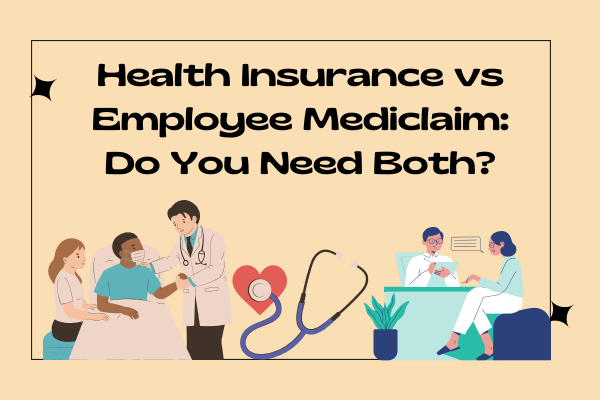Confused between health insurance vs employee mediclaim? Learn the key differences, pros and cons, and whether you should have both for better financial protection in 2025
🏥 What Is Employee Mediclaim?
Employee Mediclaim, also known as Group Health Insurance, is a health policy provided by your employer. It usually covers you and your family for hospitalization, accidental injuries, and sometimes maternity benefits — depending on the company policy.
Key Features of Employee Mediclaim:
- No medical tests required
- Covers dependents (spouse, children, sometimes parents)
- Premium is paid by the employer
- Instant coverage from day one of joining
📌 But there’s a catch: It ends the moment you quit or retire from your job.
🛡️ What Is Individual Health Insurance?
Health Insurance is a personal policy that you buy yourself — separate from your job. It offers more flexibility and wider coverage compared to most employee mediclaim policies.
Key Features of Health Insurance:
- Lifetime renewability
- More sum insured options (₹5 lakh to ₹1 crore+)
- Extra benefits like OPD, critical illness, and cashless claims
- Continues even if you change jobs or retire
🔍 Health Insurance vs Employee Mediclaim – Key Differences
| Feature | Employee Mediclaim | Individual Health Insurance |
|---|---|---|
| Coverage | Fixed by employer | Flexible – you choose the sum |
| Premium Payment | Paid by company | Paid by you |
| Validity | Only while employed | Lifetime renewable |
| Add-on Benefits | Limited | Extensive (OPD, wellness, etc.) |
| Portability | Not portable | Fully portable |
💡 Do You Need Both Health Insurance and Employee Mediclaim?
Short answer: YES. Here’s why ⬇️
✅ 1. Job Security Is Uncertain
Your employee mediclaim ends the day you leave your job, get laid off, or retire. In such times, having your own health insurance policy ensures you and your family stay protected.
✅ 2. Higher Medical Costs
Most corporate covers are around ₹3–5 lakhs. That’s not enough in today’s world, especially if you live in metro cities or need treatment at private hospitals.
👉 Having both gives you a primary cover (employee mediclaim) + backup (personal health policy).
✅ 3. No Waiting Period on Employee Mediclaim
Many personal health insurance policies have waiting periods for pre-existing conditions. Corporate covers often don’t. But remember: once you leave the job, that benefit is gone.
✅ 4. Claim Buffering
If your hospitalization cost exceeds your employer coverage, you can use your personal insurance as top-up. Some insurers even allow super top-up plans for this reason.
🧠 Expert Tip: Buy Early, Save More
The younger and healthier you are, the cheaper the premium. Waiting until after retirement or a health scare can lead to rejections, high premiums, or exclusions.
📝 Conclusion: Don’t Rely Only on Employee Mediclaim
While employee mediclaim is a great perk, it’s not a substitute for a full-fledged health insurance plan. Treat it as bonus protection, but secure your future with your own cover.
💬 Your Action Plan:
- ✅ Check your current company coverage
- ✅ Buy a personal policy NOW if you don’t have one
- ✅ Consider a super top-up for added protection
Recommended Products:

🪑 Wakefit Orthopedic Lumbar Back Support
This ergonomic back support is designed to maintain natural spine posture and reduce lower back strain. Perfect for work-from-home setups or office chairs.
Say goodbye to back pain while working from home or office.
If you’re a salaried professional spending long hours at a desk, back pain is probably a familiar companion. While you’re planning for future health protection through insurance, don’t ignore your everyday posture.

